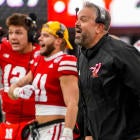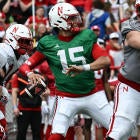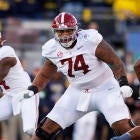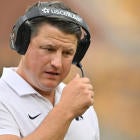The question is, will the circus move?
That would be the over-the-edge, entitlement-laden big top that lacks everything but trained elephants on the first Wednesday of each February.
We're talking National Signing Day, which officially, and for the first time, became national signing days Friday. That's when the NCAA Division I Council approved an early football signing period that begins in mid-December.
If you need the math done for you, there are now two signing days -- one in December that is meant to relieve the pressure on recruits who are frequently pressured during the process, and the other in February, which has been a high holy day on the college football calendar.
Instead of relieving pressure with multiple signing days, will this funnel all the recruiting culture -- and the accompanying unsavory silliness -- into mid-December?
There is still every chance bulldog pups will still be pulled out from underneath tables. There will still be school assemblies called to watch "crooked hats" of favorite schools donned by recruits.
"You kind of make a fashion statement and a school selection with the same fell swoop," joked Bob Bowlsby, NCAA Football Oversight Committee chair.
But will enough of the recruiting clown show be diffused? There will certainly be enough distractions that time of year. Mid-December marks the beginning of bowl games. An early signing period pre-dates most of the high school all-star games, some of which are merely commitment programming pandering to the lowest common denominator.
In other words, the game is not the thing. Sometimes the game is the vehicle for these sideline sideshows.
So that's really the question: Has an early signing period relieved the pressure on recruits, or just moved it up on the calendar?
"We're dealing with a very entrepreneurial group," Bowlsby said of the recruiting culture. "There will certainly be lots of thoughts on how to gain an advantage and how to work the system … There's only so much you can do relative to how individual student-athletes are going to announce their choices."
"The new rules clearly benefit college programs," 247Sports director of recruiting Steve Wiltfong said. "They do not benefit prospects. I don't think it did anything for the young man to get through the process any easier."
Whatever your opinion, this isn't the end of cleaning up after the circus. Youngstown State's Bo Pelini and Arizona's Rich Rodriguez are both advocates of a open signing period. You fall in love with a school, you sign? Anytime. No need to wait.
Bowlsby suggested Friday a 60-day signing period in the fall might be possible.
"This is a huge step forward," Bowlsby said, "but I would suggest it's not the last step in this process … We're going to look at ways innovatively to accommodate a population that quite apparently would like to get the recruitment process earlier in the year."
Bowlsby continued to praise the coaches' input. For the first time maybe ever, the American Football Coaches Association spoke with one voice in advocating an early signing date in January.
(The measure still has to be rubber-stamped by the NCAA Board of Governors later this month and Collegiate Commissioners Association in June.)
But we're also talking about a coaching culture that would have thought nothing of raiding Group of Five schools for coaches immediately. That's why it's key the addition of a 10th full-time assistant -- also approved Friday -- isn't effective until Jan. 9, 2018.
If it was in effect right now, there is no doubt the likes of Alabama could have lured Bowling Green's offensive coordinator to coach, say, tight ends with a massive salary upgrade.
That's simply not fair.
Neither is what January had become in recruiting. With most Power Five recruiting classes already "full" with verbal commitments, there were complaints how those schools spent that month.
That is, filling in any gaps with the best players from Group of Five recruiting lists who would be more than happy to flip.
"There are a lot more have nots, than haves," Wiltfong said. "It's somewhat socialism being brought to college football. It helps all schools where they're going to be down the stretch.
"You don't have to spend money and time recruiting kids that are already committed. Ball State doesn't have to [theoretically] go in-home to those four kids from Georgia because they're already signed in January. They don't have to sit on them because Georgia Tech might offer."
Wiltfong also countered it might not matter. In general, the have nots benefited, and anything that makes college football more equitable -- and diverse -- is a plus. In last season's College Football Playoff, Washington became only the 19th school to play for the national championship in the BCS era (since 1998).
"[The early signing period was] put in place because they're sick of the process and they're tired of schools blowing up their phones," he said.
"I think most kids that are solid, put that to rest. They don't interact much with the other programs. It's the kids that love the attention of recruiting … that continue to take the phone calls."
NCAA Council chair Jim Phillips said most other sports prefer an early signing period to provide those options. Sorry, but volleyball and soccer don't have the circus-like recruiting atmosphere of football.
"We don't know how it's going to turn out but there is a segment of the population that wants us to get it over with," said Phillips, also the Northwestern AD.
Serious discussion regarding an early signing period started at least three years ago. It involved hundreds of coaches, administrators and, yes, even players to get to this point.
One source told CBS Sports that former Oklahoma center Ty Darlington was instrumental in advising a NCAA working group to allow official visits to start for prospects from April-June of their junior year.
All of it had its beginning with Big Ten commissioner Jim Delany and former SEC commissioner Mike Slive leading the way at a luxury Southern California resort in 2014.
In one sense, three years is way too long. But that's how the legislative gears grind. Next up on the reform agenda: Staff sizes. It's a competitive disadvantage that Minnesota cannot afford any analysts but other schools -- ahem, Alabama -- can have dozens.
It's also one of the most talked about subjects in college football.
"That door has been open for a while," Bowlsby said. "We see non-coaching personnel doing coaching duties."
Bowlsby said it was not an "overstatement" to suggest overall what happened Friday was the most impactful piece of recruiting legislation in three decades.
Following a FBS conference vote that included only Conference USA as a dissenter, Bowlsby summarized, "[It is] still the beloved sport that has been such a big part of the American landscape over the last 150 years."
Maybe. What was portrayed Friday as a Norman Rockwell work of art still has to avoid coloring outside the lines.





















